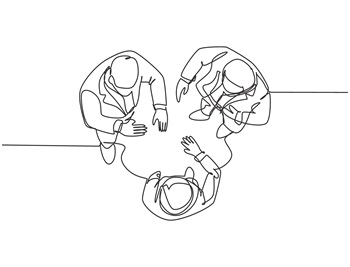<p>By David Fikes, Executive Director, FMI Foundation
<font color="inherit" face="inherit" size="-1"> </font>
</p><img src="https://www.fmi.org/images/default-source/blog-images/overhead-view-of-people-talking.tmb-large-350-.jpeg?sfvrsn=58b6b35f_1" style="margin-bottom:5px;float:right;" alt="Overhead view of people talking" sf-size="100" /><p>My 12-year-old daughter can detect the bells of the neighborhood ice cream truck ringing four blocks away, but somehow cannot manage to hear her parents four feet away telling her to take her laundry upstairs. It is not a physiological problem; it is
a psychological one and she is not alone. Every human being falls prey to selective listening, a phenomenon best captured in the Paul Simon lyric “…still a man hears what he wants to hear and disregards the rest.”
<font color="inherit" face="inherit" size="-1"> </font>
</p><p>We all are guilty of it, male or female, young or old; we lean into what we agree with, what we enjoy, and what we prefer, while we ignore that which differs from our perspective, challenges our world view, and disrupts our status quo. Every so often,
something happens that breaks through our selective listening barrier and forces us to hear – really hear – something we might not like. But if it’s not nurtured and cultivated, we’ll soon settle back into our cocoon of happy ignorance.
<br /></p><p>The issue of racial justice is a prime example of a topic that suffers from selective listening. We all tend to listen to folks who tell us what we want to hear and who agree with our perspective, while we disregard those who would challenge us and make
us uncomfortable. Occasionally, a George Floyd moment arises, a travesty of such magnitude it breaks through our barriers because it simply cannot be ignored. But if we do not find a way to fertilize the breakthrough and support the new sentiments,
we will quickly slide back into our old ways. <br /></p><p>FMI believes that creating a safe place where employees can discuss issues of racial justice is crucial to companies and our society making progress on this problem that we all find too easy to put into the disregard file. We all need help to hear what
we need to hear but might prefer to ignore. There are tools that can help us do that. <br /></p><p>On June 7 at 1 p.m. Eastern, the <a href="https://www.fmi.org/foundation">FMI Foundation</a> will host a <a href="https://www.fmi.org/forms/meeting/Microsite/Two_Sure-Fire_Tools_DEI">digital seminar</a> focused on two tools successful companies use to help them create safe places to talk about and address Diversity, Equity, and Inclusion (DE&I) concerns and make their workplace a stronger, healthier
place.
<font color="inherit" face="inherit" size="-1"> </font>
</p><p>Effective Diversity, Equity, and Inclusion Training Modules for Employees and the active use of Employee Resource Groups (ERGs) have a proven track record for helping employee recruitment, retention, engagement, and satisfaction.
<font color="inherit" face="inherit" size="-1"> </font>
</p><p>Contributing to the conversation as guest experts are Jackie Wong, <a href="https://www.mckinsey.com/">McKinsey Group</a>, and Jonathan Mayes, <a href="https://jonathan-mayes.com/">diversity consultant</a>,
who will share their expertise and insights about creating effective DE&I training modules and leveraging ERGs for business success.
<font color="inherit" face="inherit" size="-1"> </font>
</p><img sf-custom-thumbnail="true" src="https://www.fmi.org/images/default-source/blog-images/jackie-wong.png?sfvrsn=67799aa7_1" style="float:left;" sf-constrain-proportions="true" class="-align-left" width="120" alt="Jackie Wong" sf-size="100" /><p style="text-align:left;">Jackie Wong is an Associate Partner and Senior Expert in McKinsey’s Philadelphia office. He leads McKinsey’s Race in the Workplace research. Jackie has expertise in Diversity, Equity & Inclusion research and data collection, and serves
clients in talent management, DE&I, and culture transformation topics.<br /><br /><br /><img sf-custom-thumbnail="true" src="https://www.fmi.org/images/default-source/blog-images/jonathan-mayes.png?sfvrsn=3e85e70b_1" style="float:left;margin-right:10px;" sf-constrain-proportions="true" class="-align-left" width="120" alt="Jonathan Mayes" sf-size="91651" />Jonathan Mayes is CEO of Jonathan Mayes Consulting, and former Senior Vice
President, Chief Diversity & Inclusion Officer for Albertsons Companies, one of America’s largest grocery and pharmacy chains. He has received numerous awards for his work, being twice named among the “Top 100 Chief Diversity Officers
in the U.S.” Mr. Mayes is a nationally-known speaker on diversity, equity and inclusion topics and is a Certified Diversity Executive. </p><p style="text-align:left;"><br />Register today for our Tools for DEI Success digital seminar and help engage on a crucial topic too often left shrouded in covenanted disregard. </p><p><a href="https://www.fmi.org/forms/meeting/Microsite/Two_Sure-Fire_Tools_DEI" class="button">Register for Tools for DEI Success Digital Seminar</a></p>
[#item_full_content]




